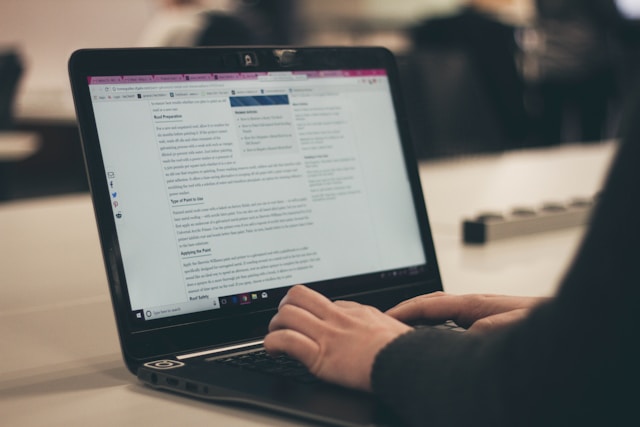Studying, especially in higher education, can be an overwhelming experience for many students. With constant assignments, exams, projects, and extracurricular activities, it’s easy to feel like you’re drowning in responsibilities.
The pressure to excel can add to the stress, causing anxiety and burnout. In such moments, seeking assistance from a professional paper writer can be an effective way to lighten the load, allowing you to focus on other areas of your study while ensuring your academic work is in capable hands.
However, it’s essential to recognize that feeling overwhelmed doesn’t have to be an inevitable part of the educational experience. Using effective strategies to manage your workload and maintain a healthy mindset, you can stop feeling overwhelmed while studying and regain control of your academic journey.
SMART Communication Goals and Objectives in Business
Craft an Achievable Study Plan
One effective strategy to combat overwhelming feelings is creating an organized study schedule. Setting out your schedule clarifies what tasks must be completed and allows for more structured studies and easier time and effort management. However, be realistic with your planning—an unrealistic timetable will only add stress!
Break Down Tasks. Instead of approaching large assignments as one daunting challenge, break them into manageable steps that you can finish in chunks. For instance, writing an entire research paper in one sitting would likely become increasingly overwhelming over time; why not break it into topics to research, gather resources for it, write the introduction, etc.?
Prioritize Tasks. Identify and assign priority and urgency ratings to tasks using methods like the Eisenhower Matrix to keep yourself focused on what truly matters.
Set Time Limits. Allow yourself to set periods to work on individual assignments, and be sure to honor those time slots. This prevents spending too long on one assignment at the expense of other responsibilities.
Include Breaks. Ensure your plan includes short breaks to allow yourself to relax and rejuvenate. Something like using the Pomodoro Technique can be very helpful here. Studying for 25 minutes, followed by five-minute breaks, can keep your focus intact without feeling burned out.
Practice Mindfulness and Stress Management
Studying can become increasingly daunting when stress levels rise. Mindfulness techniques and stress-management practices can help calm your mind, focus on the present moment, reduce anxiety levels, and enhance concentration.
Mindful Breathing. Dedicate time each day to practicing mindful breathing—even just sitting quietly, closing your eyes, and focusing on your breath may do. When your thoughts wander off track, simply gently bring them back on course with the breathing exercise. This practice helps relieve stress while increasing mental clarity.
Meditation. Even 5-10 minutes of daily meditation can significantly lower stress levels and help provide a clearer perspective when approaching studies.
Physical Activity. Exercise can be one of the best stress relievers. Exercise doesn’t need to be intense – even taking a walk outside, practicing yoga, or working out briefly can release endorphins that reduce tension naturally and put an end to stress levels.
Progressive Muscle Relaxation. This technique involves contracting and then relaxing each muscle group of your body slowly, in turn, to effectively release tension associated with stress-inducing physical tension.
Don’t Multitask
When trying to handle multiple tasks at once, your mind must switch back and forth between them, leading to mistakes or longer time spent on each.
Focus on One Task at a Time. Take steps to complete one task before moving on to the next. Doing this allows you to devote all your focus and attention to this endeavor and increase its likelihood of completion efficiently and quickly.
Eliminate Distractions. Disconnect notifications on your phone, close unnecessary browser tabs, and create an atmosphere free of distractions to help you focus on one task.
Batch Similar Tasks. Consolidate related tasks into one session for efficiency. For instance, if you must quickly respond to emails and messages, set aside an uninterrupted block of time instead of interrupting study sessions to check them.
Utilize Positive Self-Talk and Reframe Negative Thoughts
Feeling overwhelmed by studies can quickly happen if we tell ourselves we don’t have what it takes or that there’s too much work ahead. Such negative self-talk only increases anxiety and compounds our stress level further, so instead, practice positive self-talk by reframing negative thoughts into more constructive forms.
Recognize Negative Thoughts. Pay attention to what thoughts go through your mind when feeling overwhelmed. Are you telling yourself you can’t handle everything or telling yourself it is too much? These negative thoughts can fuel feelings of helplessness.
Reframe Your Thoughts. Instead of fixating on how complex or stressful a task may be, try reframing it as something more positive. For instance, when feeling overwhelmed by an intimidating project, remember that similar projects were completed successfully before, and you can retake similar steps if needed. Focus more on taking steps forward rather than on how daunting an endeavor appears at the moment.
Positive affirmations are a technique for building confidence and easing anxiety. Reciting phrases such as “I am capable,” “I can handle this,” or “I am making progress” can help shift your mindset, giving you a boost of self-belief and moving you towards action.
Take Regular Breaks and Rest Sufficiently
One key cause of feeling overwhelmed is pushing too hard without taking sufficient rest breaks. While you might believe putting off taking breaks may help get things done faster, doing too much at once often leads to burnout and reduced productivity.
Schedule regular breaks into your study routine—short breaks every 25-30 minutes and longer ones every two or three hours will help refresh and keep you focused.
Seek Assistance When Needed
Many students experience overwhelming feelings because they try to cope with the whole thing on their own, such as being frightened of appearing weak or unsure of where to turn and look for help. Seeking help can alleviate pressure levels and feelings of crush.
If you’re feeling overwhelmed by strain or tension, talking to a therapist can be beneficial. Many universities offer counseling services designed to assist their students in managing mental fitness at challenging intervals.
Exhibit Gracious Behavior and Recognise Progress
Focusing solely on what needs to be accomplished or on all that remains is easy, but such thoughts only compound feelings of uncertainty and can fuel feelings of stress and discouragement. Instead, practice gratitude and celebrate your progress to shift your focus toward the positive aspects of academic journeying.
As part of your daily practice of gratitude, take some time each day to list several aspects of life that make you thankful—whether related to studies or not. Doing this can reduce stress levels while increasing feelings of well-being.
Feeling overwhelmed during studies is an all-too-common student experience, yet it doesn’t need to define your academic journey. By adopting strategies such as creating a realistic study plan, managing stress effectively, prioritizing tasks efficiently, and seeking assistance when needed, you can reduce feelings of overwhelm and take control over your studies with greater ease and balance, leading to both academic success and well-being.










